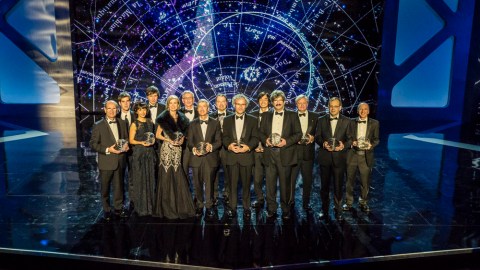The “Academy Awards” That Give Out $36 Million And Hope To Turn Scientists Into Celebrities

While presenting one of the awards at the second edition of the Breakthrough Prize in Life Sciences, Kate Beckinsale joked: “At Hollywood awards shows, when we sit back at the table, we always say, ‘Well, it’s not like we’re curing cancer.’ So, it’s reassuring to be in a room of people who can sit down and say, ‘I, actually, am curing cancer.’
The ceremony that took place on November 9th at NASA’s Hangar One in Silicon Valley, looked almost as glamorous as the Academy Awards, but instead of actors and directors, the place was filled with hard-core scientists. They were there to celebrate twelve of their colleagues who received the Breakthrough Prize trophy and a financial award of $3 million each (almost twice the value of the Nobel Prize) for their groundbreaking work in the areas of Fundamental Physics, Life Sciences and Mathematics.
The award was conceived by Russian entrepreneur Yuri Milner, who in 2012 established the Fundamental Physics Prize and personally chose nine scientists to receive $3 million each – the biggest sum awarded for academic achievement in the world. He was then joined by Marc Zuckerberg and his wife Priscilla Chan of Facebook, Sergey Brin of Google, and Anne Wojcicki of 23andMe, to establish and fund the Breakthrough Prize in Life Sciences in order to award and celebrate scientists for their pioneering research, that often remains outside of the spotlight and sometimes takes decades to complete. One of the main goals of the award and the ceremony is to make the general public excited about science by turning scientists into celebrities young people would want to emulate.
“We know how to celebrate physical achievement and entertainers, but I think it’s about time for us to learn how to celebrate scientists and science . . . for at least one hour a year,” said Milner for Vanity Fair
Anne Wojcicki adds that, “These scientists should be household names and heroes in society.”
Amongst the achievements highlighted in the awards show were the unexpected discovery, by two independent teams, that the expansion of the universe is accelerating rather than slowing (Saul Perlmutter of the Supernova Cosmology Project and Brian P. Schmidt, and Adam Riess of the High-Z Supernova Team); a revolutionary development in the treatment for Parkinson’s disease, the award for which was emotionally presented by a young man who had successfully undergone the treatment (Alim Louis Benabid of Joseph Fourier University); and a technique for editing genomes that could allow the replacement of faulty genes in our DNA (Jennifer Doudna of University of California, Berkeley and Emmanuelle Charpentie of Umeå University)
One of the recipients in the Fundamental Physics category, Saul Perlmutter, told the Guardian that the most striking aspect of the Breakthrough Prizes was their emphasis on fundamental science.
“It was a way of reminding our larger society how much it depends on deep, foundational research that never looks like it is practical at the time, but somehow over and over again has completely transformed our society, leapfrogging over the incremental, applied research, for which the need is more obvious.”
Addressing criticism that the money spent on the awards may be better used elsewhere, Mark Zuckerberg commented in front of BusinessWeek:
“If I could snap my fingers and do one thing in science, I would get more funding for basic science. But the level of funding that needs to be done is not on the order of millions, like the cost of the Breakthrough Prizes. It’s billions to tens of billions. It’s really the type of thing that only governments can fund. I feel like the thing we can do is celebrate people doing great work and create more cultural momentum and awareness that this is an important thing in the world. So when the next economic crisis hits and people are talking about where to cut from the budget, science isn’t the thing.”
This year’s recipients will form a committee that will select next year’s laureates. The process will be completely transparent with everyone being able to nominate a scientist. After receiving the award, the laureates take part in lecture series in which they describe their research to the general public. Videos of these lectures can be watched here.
Here you can find the full list of the recipients of the 2015 Breakthrough Prizes in Fundamental Physics and Life Sciences as well as the five laureates in Mathematics.
Photo: Breakthrough Prize





